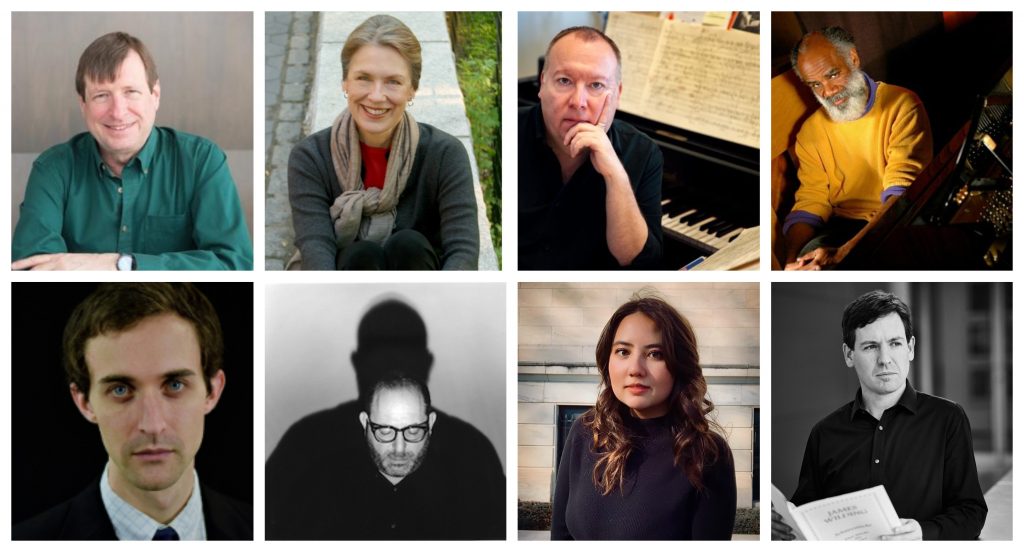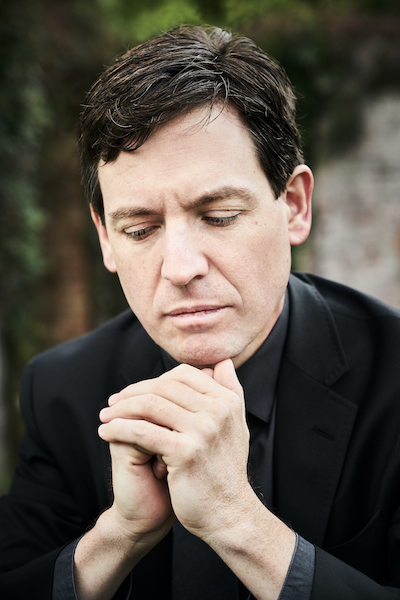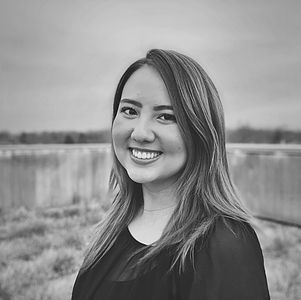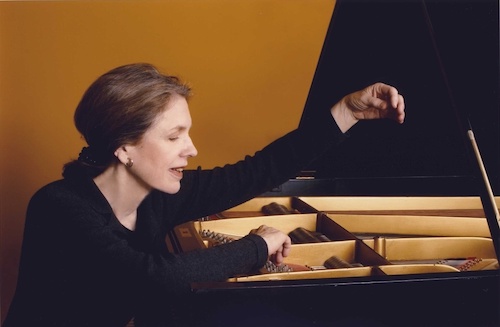by Jarrett Hoffman

Composers have been flying a little more under the radar — and in a way, that’s natural. “Sheltering in place isn’t that much different than being on deadline for a piece,” Oberlin Conservatory professor Stephen Hartke wrote by email. Cleveland Institute of Music professor Keith Fitch agreed: “A quarantined composer is not so different from a non-quarantined composer.”
Hartke and Fitch are two of the eight composers — including professors, freelancers, and young professionals — who agreed to share their thoughts for this article. After establishing that all things considered, they’re healthy and well, we delved into how — or whether — the pandemic has impacted their writing.
One category that emerged is composers who aren’t letting current events affect their music, whether they’re pressing forward with projects they began before the coronavirus hit, or starting new pieces.
“I’m in the zone,” Lorain County Community College professor Jeffrey Mumford said by telephone. “I’m just focusing on getting the work out as best I can.”
That includes two ongoing projects — a solo violin piece and a cello concerto — as well as a “bucket-list” piece for him: a double concerto for violin, cello, and orchestra. The soloists will be Lauren Cauley and Mariel Roberts, who visited LCCC’s Signature Series last fall.
“It’s something I’ve always wanted to do, and they’re such amazing players and nice people,” Mumford said. “I find that the older I get, the more I want to work with good players, but also nice players.”
Fitch noted that with one exception — the Sandy Hook Elementary School shooting in 2012 — his music “isn’t really affected by external events.” In fact, the piece he’s currently writing happens to be celebratory. “I’m enjoying going into a more positive space when I work on it,” he said.

With that in mind, he recently returned to a project for players he already knows well — a trio for himself at the piano and two of his colleagues from the university, oboist Jack Harel and bassoonist Cynthia Cioffari. “The occasion is the celebration of Jack’s upcoming promotion to Full Professor of Practice, a title shared by Cynthia and myself,” Wilding said. “So it’s our chance to welcome him into our little club, as it were.”
Since he’s familiar with Harel and Cioffari as players and people, he’s been able now to devote himself to the solitary matters of his craft. “I bathed my ears in music for oboe, bassoon, and piano,” he said, and began to create “the next addition to this ensemble’s beautiful tradition.”
Theo Chandler, an Oberlin graduate currently pursuing his Doctorate of Musical Arts at the Rice University Shepherd School of Music, has seen all of his commissions for the next few months postponed. Armed with extra time, he started to write a new piece — a clarinet quintet — for no commission money. That’s in addition to revising old works, a task many others also plan on clearing from their to-do lists.
Another category: composers who are noticing that their projects mirror the world a little differently given the state of affairs. Hartke is writing a sextet called Desperate Measures, meant to be performed at a summer festival that he knows might not take place. “It’s coming to be a reflection on these unsettled and unsettling times.”
He’s also working with stage director David Schweitzer on an opera libretto adapted from Eugene Ionesco’s play Rhinoceros, in which people suddenly begin turning into those horned animals. “We’ve been at work on this for a long time, but there is something about the play that has become even more apropos,” Hartke said.
Cleveland Composers Guild member and former CIM professor Margaret Brouwer continues to work on a commission from three musicians in the American Wild Ensemble. Fear is a central element of the piece, which evokes “animals near the shores of the Great Lakes who are afraid, whose homes and lives are in jeopardy,” Brouwer said.
Now, fear from the human world is also entering the piece. “It is interesting to think of our plight being similar to what the animals have been experiencing for some time,” Brouwer said. “Perhaps the greatest part of the fear — for us and for the animals — is not knowing when or if the threat will strike.”
Tim Beyer, artistic director of the new music ensemble No Exit, doesn’t plan on shaking up the direction of his composing, but he acknowledged that the pandemic will have some effect on it, perhaps subconsciously.
“This is probably true of most people as well, but for me, where I am in the moment — whether because of external circumstances like what’s going on now, or internal things — certainly affects how I conceive of composing. Having said that, I’m not planning on writing a piece about being locked in the house.”
Beyer plans to get back to working on a piece based on Franz Kafka’s short story A Hunger Artist. “I have a very solid idea of what I want it to do, but I’m sure isolation and anxiety will find their way into it in some way.”
Natsumi Osborn, a third-year Oberlin student who is also composer-in-residence at the Northern Ohio Youth Orchestra, found herself suddenly uprooted in mid-March, when she was required to pack up her things and leave campus. She’s currently at home in Houston, where she attended high school.
At first — with the move, settling in, and the overall sense of uncertainty — she took some time away from music. Last week, classes resumed remotely, and with that return to structure, she’s found the time and the mental space to compose, which has been “quite welcoming,” she said.

“Music for me is a way to process narratives and emotion in hindsight rather than in-the-moment, as sort of a final closure,” she said. “So writing about the pandemic right now just doesn’t feel intuitive.”
Continuing previous projects has brought comfort and a sense of stability. “I have been working on a song cycle based on poetry by my great-grandmother, which has been an exciting family research-based project.”
Being removed from the mindset of constant work at college, and taking long walks in nature during her self-quarantine in Houston, Osborn has felt her mind clearing, and her concentration on the present moment sharpening.
“It has allowed me to compose with more focus — being in tune with what I really want to hear in my music — rather than being constantly focused on a deadline, writing as part of the flurry that is college life, or writing solely to meet all of the subconscious expectations I tend to set up for myself.” For her, that’s been “a small silver lining of the pandemic.”
A few composers offered their perspectives about the future. Fitch finds that it helps to look forward to next season — what his CIM New Music Ensemble will perform, and which guest composers he might invite to campus. “This WILL be behind us someday, and we can get back to live music-making,” he wrote.
Said Mumford, “I think when this thing passes, people will be tripping over themselves to get out of their houses and re-engage with the world. And what we do as artists will play a major role because civilization depends on it. We need this for our souls.”
Published on ClevelandClassical.com April 7, 2020.
Click here for a printable copy of this article




